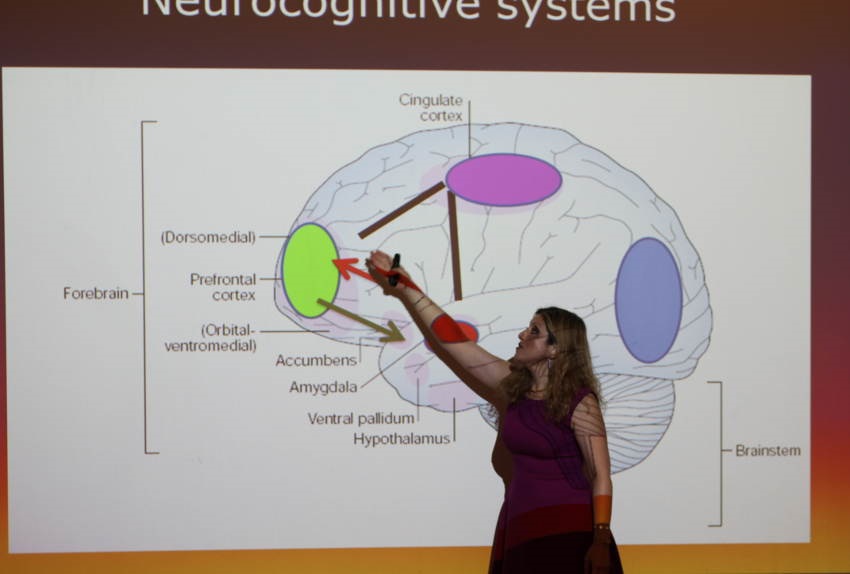This post was contributed by Bethany Chapman, PhD candidate at Birkbeck. From October she will be working with the Building Resilience in Breast Cancer Centre (BRiC) to investigate ‘The efficacy of neurocognitive training on improving the processing efficiency and long-term quality of life of breast cancer survivors returning to work.’ Bethany attended Professor Derakshan’s Birkbeck Science Week talk on Thursday 21 June.

Breast cancer and its impact on emotional and cognitive health
Breast cancer is the most prevalently diagnosed form of malignancy amongst women, with recent figures revealing that a new case is diagnosed every 10 minutes in the UK. Given, its exceptionally high prevalence (75% increase since 1970s) breast cancer is currently considered across the world to be one of the most leading causes of health concern. Interestingly, evidence has denoted a significant increase in the number of younger pre-menopausal women being given a diagnosis. In particular, younger women appear to be diagnosed with more aggressive forms of breast cancer reflective of a higher grade (higher rate of cell multiplying) and stage tumour.
At present, breast cancer is targeted by a diverse range of interventions and treatments including, surgery (mastectomy), chemotherapy and/or radiotherapy as well as endocrine therapy. Whilst these interventions have greatly decreased the mortality rate most women that enter breast cancer survivorship following the completion of active treatment experience both emotional and cognitive vulnerability.

Professor Nazanin Derakshan revealed that women frequently report experiencing a range of emotional symptomologies (vulnerabilities) including:
- Chronic anxiety and depression
- Post-traumatic stress disorder (PTSD)
- Intrusive thoughts regarding breast cancer recurrence
- Poor quality of life (provoked by social isolation)
and cognitive dysfunctions (commonly known as ‘chemo-brain’) including:
- Difficulty with concentration
- Everyday memory loss
- Difficulty retaining information
- Poor Processing efficiency (i.e. slower responses)
 So, is there a relationship between cognitive vulnerability and emotional vulnerability?
So, is there a relationship between cognitive vulnerability and emotional vulnerability?
Crucially, Professor Derakshan divulged during her fascinating Science week talk that her team at Birkbeck have identified a directional causal relationship, in which cognitive dysfunction highly exaggerates the severity of psychological (or emotional) vulnerabilities (i.e. anxiety) experienced by breast cancer survivors. Furthermore, she stated the team extended their research to discover that this relationship is moderated by the grade of breast cancer diagnosed. For instance, women diagnosed with a higher grade (grade 3) of breast cancer exhibit a stronger relationship between cognitive vulnerability and emotional vulnerability.
Taking, all this novel research into consideration Derakshan raised an interesting point promulgating that it is imperative for future research to examine the cognitive health and emotional health of breast cancer survivors in unison, a previously problematic issue within the field of psycho-oncology.
How are researchers at Birkbeck aiming to build resilience to cognitive dysfunction and emotional vulnerability?
Neuroimaging research has shown structural and function changes in the brain related to the cognitive dysfunction(s) experienced following the completion of anti-cancer treatment, such cognitive dysfunction(s) is described by researchers as a ‘hidden cost’ of treatment as there are no significant behavioural differences observed when performance is compared with a control population. Interestingly, cognitive neuroscientists have evinced that breast cancer survivors recruit additional cognitive resources in order to compensate for the inefficiency (dysfunction) of their chemo-brain, this process is known as ‘compensatory effort’.
Furthermore, clinical research has reported that psycho-therapies such as cognitive behavioural therapy (CBT) are ineffective in adequately reducing the severity of emotional symptomologies encountered by the breast cancer population. Taken all this research into consideration, Derakshan and her Birkbeck laboratory in partnership with the BRiC centre are experimentally analysing the effect of exercising cognitive function through the use of neurocognitive interventions including, the Adaptive Dual N-back Training on emotional vulnerability—with promising results already being discovered.
One captivating study highlighting these incredible that was discussed by Derakshan during the talk, revealed that women that received 12-days of Adaptive Dual N-back training presented with significantly reduced levels of anxiety and distress, with these effects being sustained at the 14-18-month follow-up. Additionally, the study also showed a decrease in women’s rumination at the final follow-up, 14-18-months post-training. Derakshan disclosed that one possible explanation for these highly promising findings is that exercising cognitive function through adaptive training increased the fronto-parietal connectivity by enhancing the process of myelination and/or strengthened the synaptic connectivity.
In sum, Professor Derakhshan presented a highly insightful talk, outlining the incredible role that cognitive neuroscience has in promoting sustained cognitive and emotional resilience in women diagnosed with one of the most prevalent malignancies in the world.